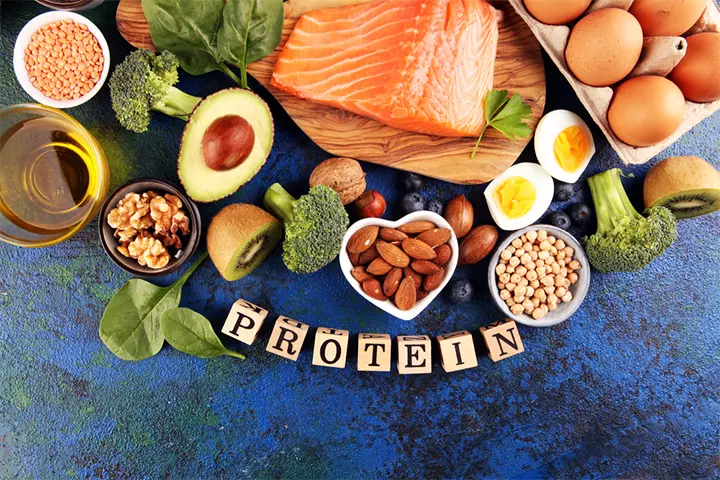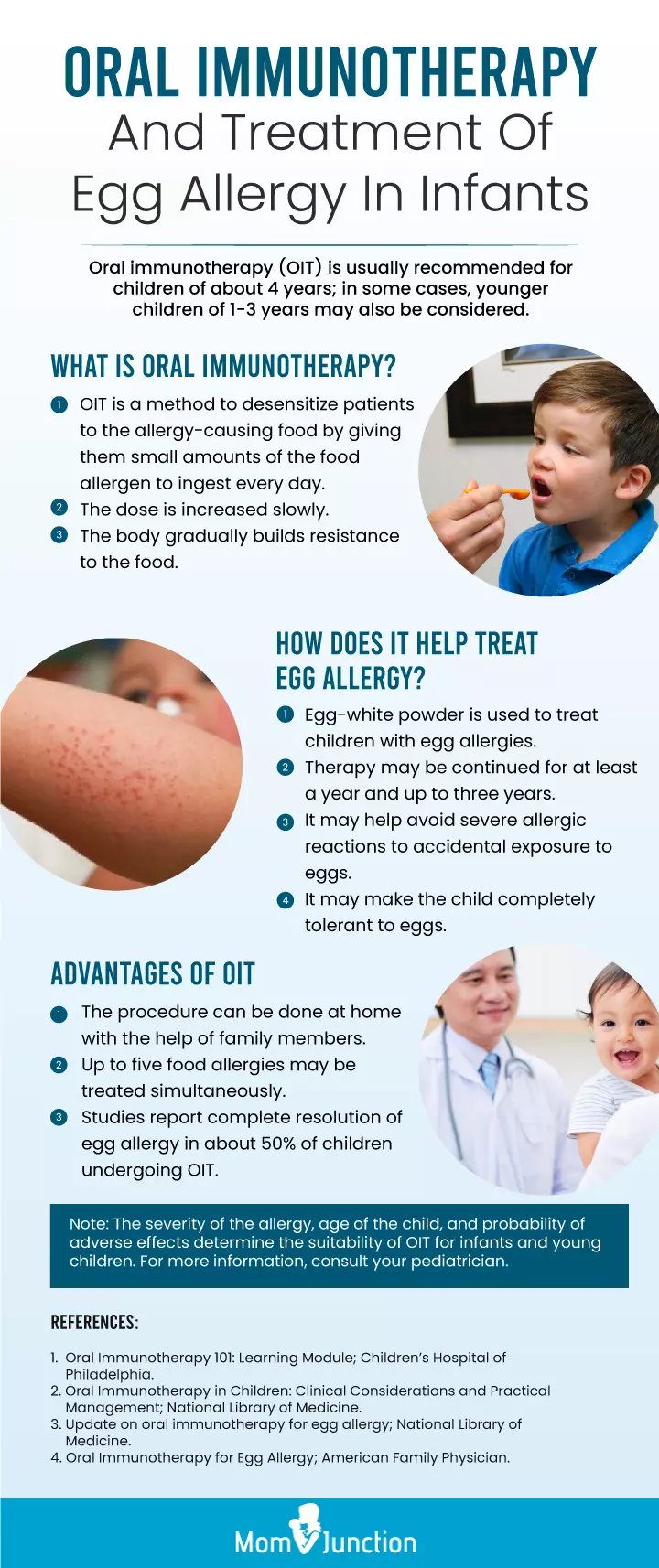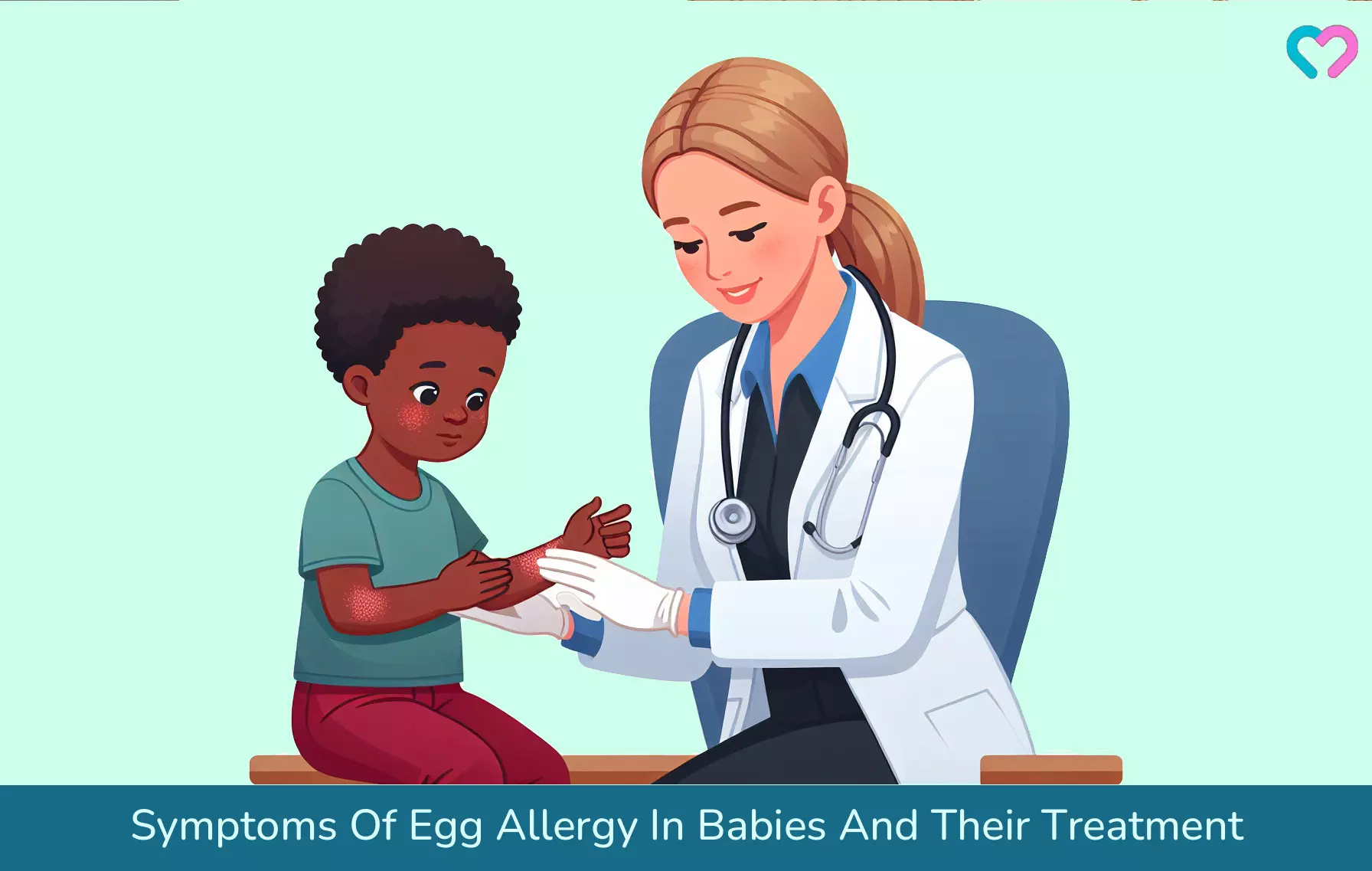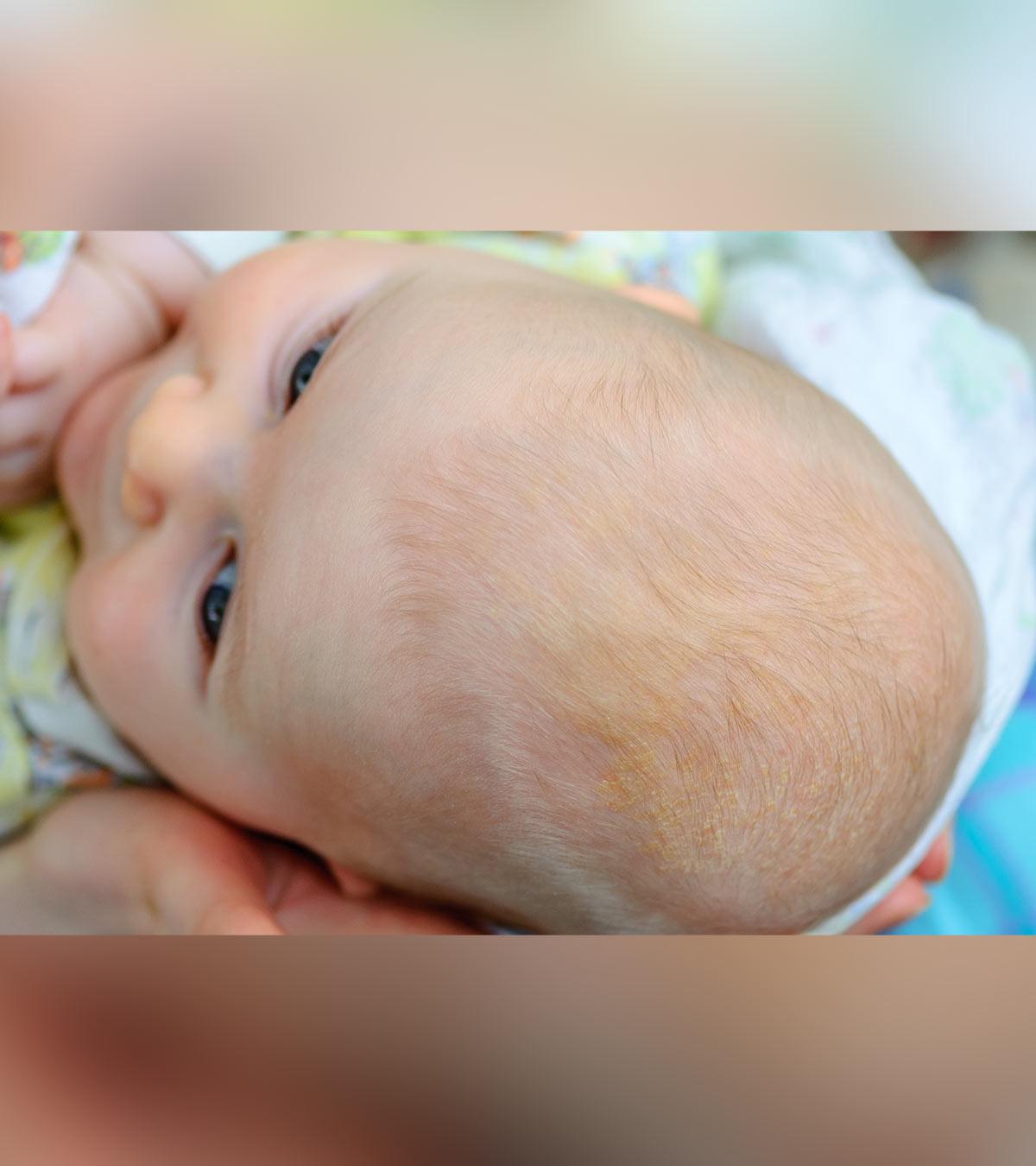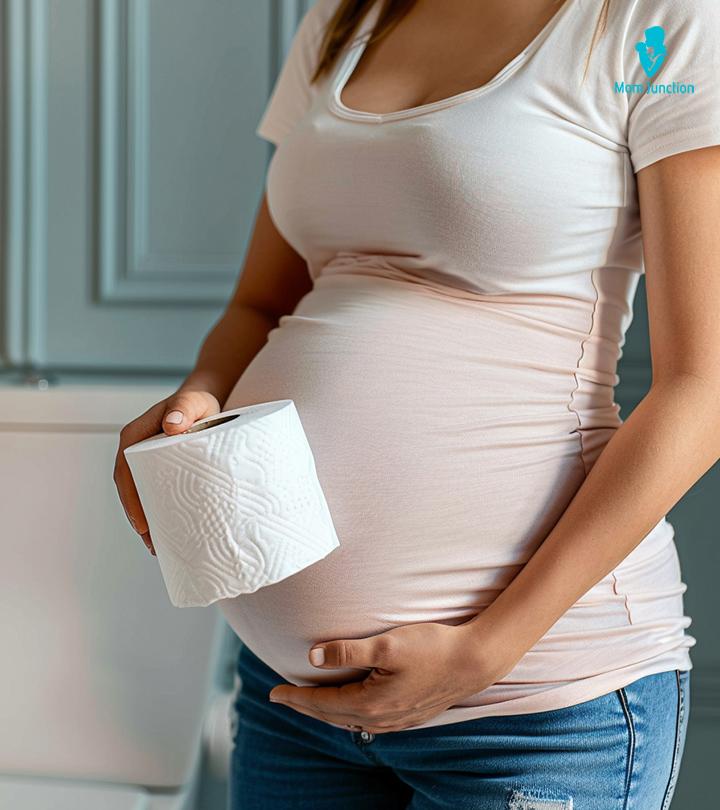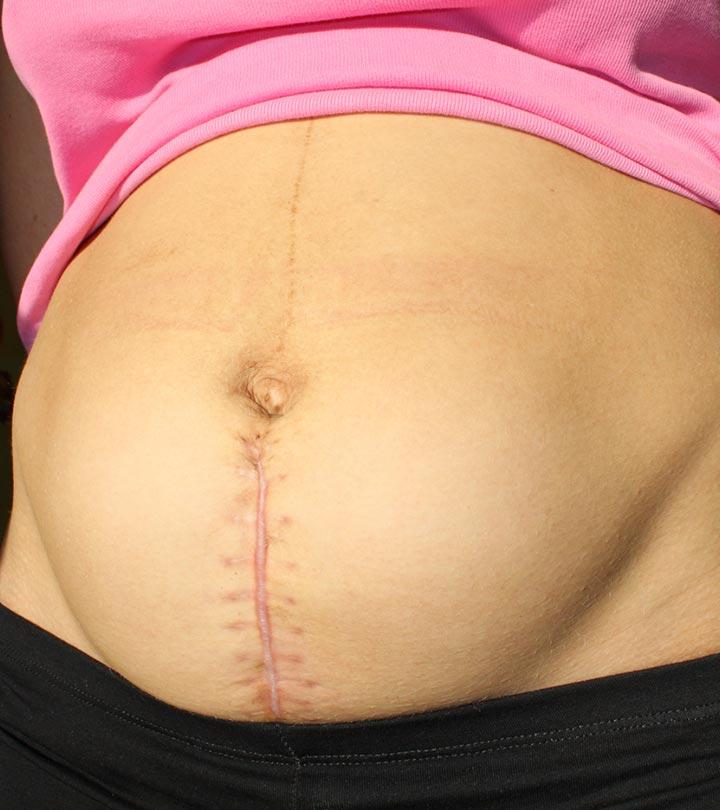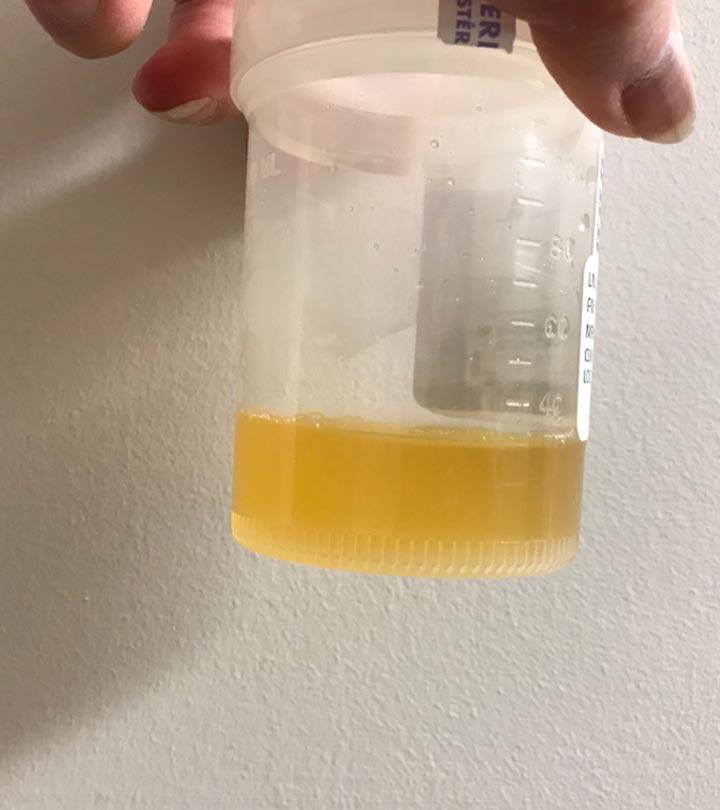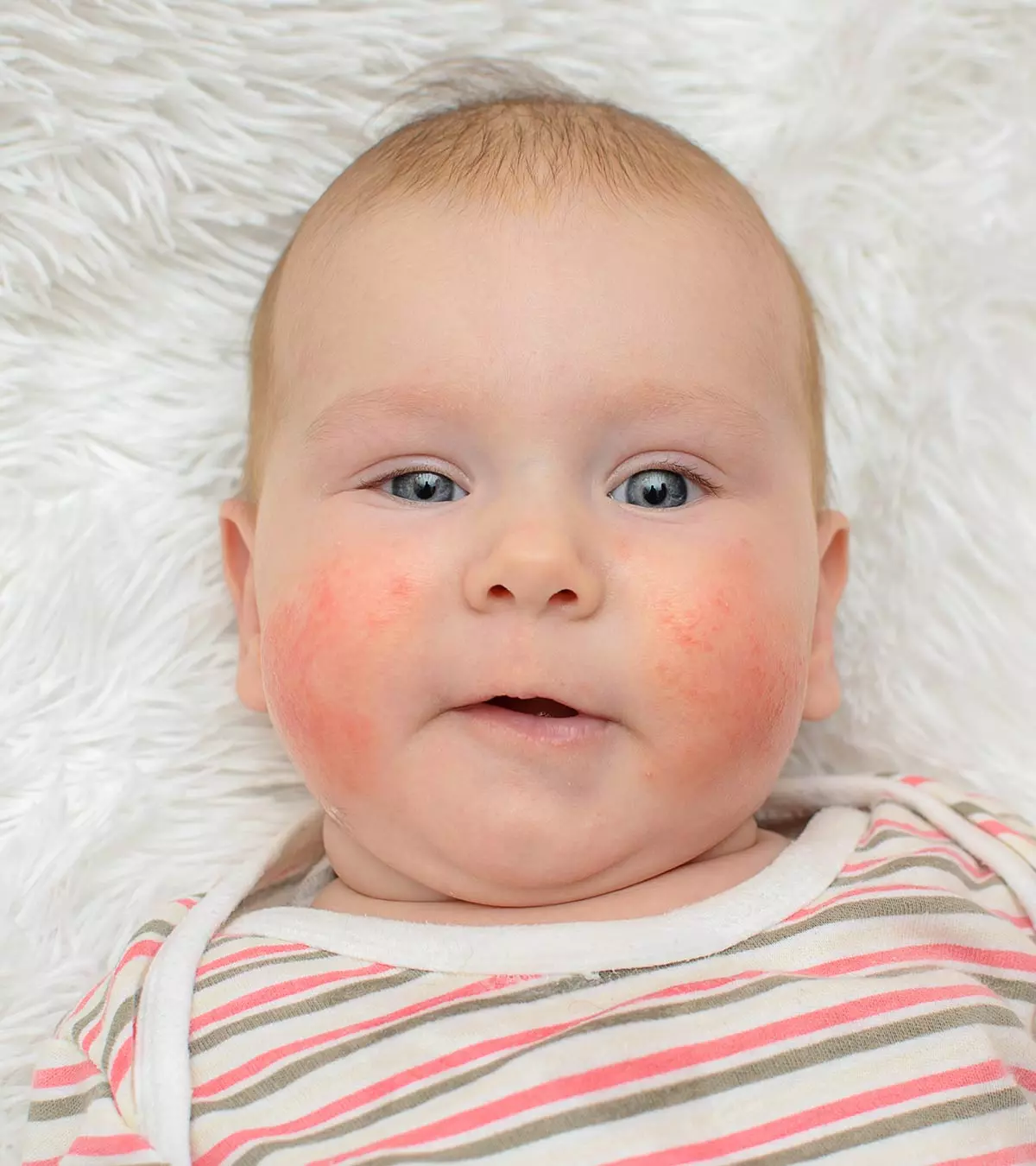
Image: Shutterstock
Egg allergy in babies occurs if the proteins in the egg yolk or white trigger a hypersensitivity reaction in their immune system. The condition is more likely in infants with one or both parents with the same allergy. The symptoms may or may not appear immediately after consuming eggs, leaving you confused about why your baby suddenly fell sick. You should check with a pediatrician if you suspect your baby is allergic to eggs. In the meantime, read this post to understand the symptoms of egg allergy in babies and the preventive steps you may take.
Key Pointers
- Symptoms of egg allergy include mouth swelling, skin hives, nasal congestion, fever, vomiting, and abdominal pain.
- Anaphylaxis, which involves extreme abdominal pain, fast heartbeat, and a drop in blood pressure, can also occur.
- Egg allergy can also lead to other allergies, such as allergies to fur, dust, dust mites, pollen, milk, soy, peanuts, and fish, as well as long-term shortness of breath or asthma.
- The diagnosis of egg allergy involves analyzing the baby’s diet and medical history, as well as tests such as dietary modifications, skin prick test, and food challenge test.
- The treatment depends highly on the severity of the allergic reaction and can include medications such as antihistamines and epinephrine injections.
What Is Egg Allergy In Babies?
Your baby’s immune system works round-the-clock to protect your little one from parasites, bacteria, and viruses. However, as the immune system in babies is not fully developed, it cannot be as efficient as an adult’s.
- The fundamental cause of an egg allergy in babies is the inability of the immune system to differentiate the egg proteins from disease-causing pathogensiMicroorganisms (viruses, bacteria, fungi) that can cause disease in humans and animals . The body sees the egg proteins as foreign invaders and mounts an attack by releasing antibodies called immunoglobuliniAlso known as antibodies, proteins produced by the immune system to protect against foreign invaders like bacteria and viruses E (IgE).
- The cells sense the presence of IgE and promptly release histaminesiChemicals released by the body during an allergic reaction, causing symptoms such as itching, sneezing, and nasal congestion , resulting in skin rashes, runny nose, etc., which alert the individual or those around him about the presence of an allergy (1).
- Your baby can develop an allergy to any form of the egg, be it raw, boiled, cooked or even loosely-cooked. Moreover, it can occur in breastfed babies if the mother eats egg (2).
Katie L. Moreno, a mom and a blogger, writes, “At 11 months old, I gave my son his first forkful of eggs. Although he usually took great afternoon naps, I thought the ‘No-Nap-Today-Mommy’ attitude wasn’t necessarily unordinary behavior for my soon-to-be 1-year-old.
“As I laid him down to change his diaper, he looked me in the eye and started to chatter his teeth. Adrenaline pumping, I scooped him up, grabbed my keys, and headed to the car. We made it to the clinic just before the vomit started. The blood antibody test concluded he was allergic to egg whites, almonds (tree nuts), and peanuts — three of the top nine allergens which cause the majority of food allergic reactions (i).”
 Quick fact
Quick factEgg Proteins That Cause Allergy
Egg white and yolk contain proteins that can trigger an allergic reaction by the immune system.
Egg white proteins:
- Ovomucoid
- Ovalbumin
- Ovotransferrin
- Lysozyme
Egg yolk proteins:
- Livetin
- Apovitillin
- Phosvitin
Egg white is usually a more common cause of allergies than egg yolk.
But why are some babies more vulnerable than others?
Risk Factors For Egg Allergy
Certain factors may put your baby at a risk of developing an allergy towards eggs.
- Genetic inheritance: If you have a family history of food allergies or one of the parents suffers from an allergy, then there is up to 40% chance for the baby to develop an allergy.
- Cross-reactivity: If your baby tends to have allergic reactions, they may also develop an allergy to eggs. Babies with allergies to other foods, such as grains and nuts, are at a higher risk of developing an egg allergy. This phenomenon is known as cross-reactivity. Cross-reactivity occurs when the immune system senses one protein is closely related to another. According to Centers for Disease Control and Prevention (CDC), in 2021, about 27.2% of children in the US aged 0-17 years were diagnosed with symptoms of one or more types of allergy, and 5.8% of the population, which counts to about one in every 20 babies, had food-related allergies.
- Illness: Since allergies involve the immune system, a recent bout of severe illness may make the body highly sensitive and alert towards foreign substances. This means the body would consider the egg proteins as potential agents of infection, prompting the immune system to attack them.
If your baby comes under any of the above three categories, you need to be extra cautious. Do not ignore the symptoms, if you think your baby is allergic to eggs.
Signs And Symptoms Of Egg Allergy In Babies
The signs of an egg allergy in babies can be very similar to a conventional illness and may take a few minutes to an hour to show.
- Skin hives: Red bumps or rashes that cause mild to severe itching. A complication of the condition can lead to eczema.
- Mouth swelling: You may notice swelling in lips and perhaps even a swollen tongue.
- Redness in eyes comes along with itching, swelling, and excessive tearing.
- Nose congestion accompanied by clear discharge, redness, and itchiness of the nose.
- Swelling in the throat due to which your baby may show discomfort while swallowing.
- Gastrointestinal symptoms such as abdominal pain accompanied by diarrhea.
- Vomiting and nausea: The baby appears uncomfortable due to a continuous feeling of nausea.
- Shortness of breath in lungs: The baby will wheeze and breathe rapidly. If the condition persists over a period, he might develop asthma.
- Weak heart pulse may cause a feeling of dizziness.
- Anxiety and agitation: After a sudden bout of anxiety, the baby may appear to be losing consciousness.
 Point to consider
Point to consider- Fever: An increased body temperature, which is often accompanied by any of the aforementioned symptoms.
- Eosinophilic esophagitis: A food allergy that causes inflammation of the esophagus that can cause difficulty in swallowing, vomiting, and, in severe cases, food impaction in the esophagus.
- AnaphylaxisiPotentially life-threatening allergic reaction with symptoms like difficulty breathing, hives, and facial/throat/tongue swelling : In an extreme case of allergic reaction, the baby may go into anaphylactic shock, a condition known as anaphylaxis. The condition is life-threatening and displays with the following symptoms:
- Extreme abdominal pain to the point the muscles get severely cramped.
- Swollen throat muscles that constrict the airways, thus making it difficult for the baby to breathe.
- Rapid heartbeat and an increase in pulse rate.
- A sudden bout of increased pulse will follow a drastic drop in the blood pressure, making the baby feel dizzy due to less blood being pumped to the brain. Eventually, he might lose consciousness.
Anaphylaxis can be fatal and requires immediate medical intervention.
While these are the symptoms of egg allergy, there could be other complications due to the allergy, because egg allergy may not always come alone.
Egg Allergy And Complications
Egg allergy could lead to other allergies or conditions mainly as a manifestation of certain complications. Your baby may or may not show such complications, but they have a higher risk of displaying the following symptoms:
- Allergies towards fur, dust, dust mites and pollen.
- Allergies towards other foods, usually rich in proteins, like milk, soy, peanuts and fish.
- Development of atopic dermatitisiA skin condition characterized by inflammation, redness, itching, and blistering caused by allergies, irritants, or genetics or eczemaiA skin condition characterized by red, itchy, and dry patches and can be managed with proper skin care and medication as a severe form of skin hives.
- Long term shortness of breath or asthma.
These problems often occur as an extension of the egg allergy symptoms, and it is quite likely that treatment may alleviate these complications.
When you see one or more of the above symptoms or complications, do not assume things but take your baby to a doctor, who will diagnose the exact cause. It is important to get it tested before concluding that the baby has egg allergy.
Prevalence Of Egg Allergy In Babies
Egg allergy is prevalent among infants and young children, standing out as one of the most common causes of food allergy in that age group. Egg allergy often diminishes over time, particularly beyond three years of age. Also, the majority of significant egg allergy reactions occur in very young children with infantile eczema. While severe, life-threatening responses can occur, instances of adversities from egg allergy are rare.
Most reactions, even severe ones, manifest between 6 and 15 months of age when eggs are introduced (3).
Diagnosis Of Egg Allergy
The doctor will analyze your baby’s diet and history of illness and other allergies. Most commonly, he will employ the following procedures:
- Dietary modifications: The first thing a medical practitioner will ask you to do is to eliminate all suspected allergens from the diet of the baby. He will then ask you to reintroduce one allergen at a time in your baby’s diet. Adopting an elimination diet can assist in pinpointing the particular food item responsible for the allergy.
 Quick fact
Quick fact- Skin prick test (SPT): A small amount of an allergic substance is placed on the skin of the baby. The skin is pricked or scratched to check for any reaction (4).
- Blood test: Blood tests called RAST (radioallergosorbent test) and ELISA (enzyme-linked immunosorbent assay) are run to determine the presence of antibodies in the blood that may indicate allergy towards eggs.
Image: IStock
Your doctor will suggest an appropriate treatment based on the result of the diagnosis.
Treatment Of Egg Allergy In Babies
The treatment will depend on the severity of the allergic reaction. The physician will aim at trimming down the number of symptoms and their intensity so that the baby does not face any threat to his life. There are two courses of treatment for egg allergy in babies:
- Medication: If the symptoms are mild then the doctor will prescribe an antihistamineiA medication that helps relieve symptoms such as runny nose, sneezing, and itching caused by allergies . You can administer it orally at home. In the case of anaphylaxis, the doctor will give an injection of epinephrineiA hormone that helps the body handle stress by increasing heart rate, blood pressure, and blood sugar levels , also referred as adrenaline. He would advise you to purchase auto-inject epinephrine injections to keep them handy in case the baby breaks into an anaphylactic shock again (5).
Epinephrine auto-injector is a self-administered intramuscular injection that administers epinephrine when dabbed to the skin with a certain force. Your pediatrician will educate you about spotting anaphylaxis and prescribe your baby a certain number of epinephrine auto-injectors that you must keep handy. When you notice your baby getting into an anaphylactic shock, dab the auto-injector into the baby’s thigh where a needle delivers epinephrine to the body through the muscle.
- Dietary modifications: The physician will ask you to eliminate egg from the diet of your baby and avoid any food that contains egg. If you are breastfeeding him, you need to stop consuming egg foods. This will prevent the recurrence of allergy symptoms.
The baby may stop showing the symptoms after a course of treatment. But since there is no cure for egg allergy, avoiding egg is the only way to keep your baby free from harm.
Egg Derivatives Found In Food
You need to avoid not just the egg but also foods that have eggs in them. Many over-the-shelf food items contain a derivative of egg white or yolk. While purchasing food, make sure to read the food labels carefully to check whether the following ingredients are added to the food.:
- Powdered egg
- Albumin
- Globulin
- Livetin
- Lysozyme
- Ovalbumin
- Ovoglobulin
- Ovomucoid
- Ovotransferrin
- Ovovitella
- Silici Albuminate
- Simplesse
- Ovovitellin
- Vitellin
Following are some food products that may contain egg:
- Baked products like cake, pastries, rusk, certain bread, etc.
- Ice cream
- Pudding and custards
- Mayonnaise and salad dressings
- Dressing on fried meat like fried chicken
- Pasta
- Sauces
The egg is nutritious and contains a high amount of proteins. Therefore, you need to find alternatives, so that your baby is not deprived of the goodness of egg.
Healthy Replacement For Eggs
Image: Shutterstock
Following are certain foods that make a great substitute for eggs, specifically in terms of infant nutrition.
- Meat: Meat from poultry is a great way of replacing an egg in the diet when you have a breastfed baby allergic to egg or a baby above six months who can be fed on meat. It is a great source of zinc and dietary minerals that help a baby grow better (6). You can feed meat in a pureed form and once your baby is old enough to chew, you can start with solid nugget size meat pieces.
- Legumes: Legumes or dal has proteins in abundance. You may boil it with rice, make a paste or puree depending on the age of your baby.
- Nuts: Nuts are an amazing source of vitamins and good cholesterol and thus make a great substitute for eggs.
- Leafy vegetables: Leafy vegetables are a good source of minerals and vitamins.
- A caveat: You must check whether or not your baby is allergic to the said food items before feeding them to him.
Tips On Prevention Of Egg Allergies In Babies
Egg allergy does not have a definite cure and every treatment is targeted towards the mitigation of the symptoms. Here are some tips which can help you prevent allergies among babies.
- Introduce egg early in life: Research has shown that introduction of a food item early in a baby’s life can reduce the chances of developing an allergy (7). This usually happens by the desensitization of the body’s immune system towards the food item. Over a period, the immune system can identify the proteins in the egg as harmless and thus stops attacking them with an antibody response.
Image: Shutterstock
- Attempts while breastfeeding: A breastfeeding mother may avoid egg to prevent an allergic reaction in her baby. However, research has shown that it is not always necessary to avoid allergic foods when breastfeeding because breast milk strengthens the immune system of the baby. This means the system becomes more competent at differentiating between proteins and pathogens. You may use this prevention measure on a trial and error basis.
- ImmunotherapyiA type of therapy that uses the body's immune system to fight cancer : In this treatment, the baby receives some egg over a period to desensitize the immune system (8). The treatment begins with a small dose, followed by incremental doses at fixed time intervals. The baby’s condition is monitored and if he shows a complete withdrawal of the allergy symptoms, he is declared safe to consume the food.
The above-mentioned measures were arrived at after conducting tests in a controlled environment. Therefore, we advise you to consult a pediatrician before adopting any prevention measure for egg allergy in your infant.
Tips On Controlling Egg Allergy
Many babies outgrow their allergy over a period. Many times, the allergy persists until adolescence and then disappears. Here are some useful tips that can help you control egg allergy in your baby:
- If your baby has been clinically diagnosed with severe egg allergy, always keep an epinephrine auto-injector with you. Epinephrine auto-injectors can help save precious moments between the onset of allergy and medical attention (9). You may still have to take your baby to a pediatrician but he will be at a lesser risk.
Image: Shutterstock
- Keep eggs and egg products out of your baby’s reach as even a slight brush of the lips can trigger a full-blown allergic reaction. Some babies could be so sensitive that they may develop an allergic reaction just by staying in the company of someone who just ate an egg! This is hypersensitivity, and you need to be extra careful with such babies (3).
- An allergic reaction may sometimes show mild symptoms. For example, your baby may just appear lethargic and pale, which could be a sign of egg allergy. If you suspect something is amiss, then take him to a pediatrician.
- Some babies may have an allergy only if they eat the egg directly and can tolerate it as an ingredient in other food preparations. This means they will be able to eat cakes or other items in which eggs are added before the baking/cooking process. You may try this cautiously (10).
, MD, IBCLC, a physician and lactation consultant from Colleyville, Texas, says, “Most babies outgrow their egg allergy over time. Generally, about half of egg-allergic children no longer react to egg protein by school age. About two-thirds of egg-allergic children can tolerate eggs baked in things like cakes, cookies, and pasta. Heating the egg to baked temperatures will denature the main protein that causes an allergic reaction in these children.”
You can avoid any egg preparations for your baby to prevent problems for him. But what about the medicines that contain eggs? Can you afford to avoid them too?
Egg Allergy And Vaccinations
Certain vaccines use egg whites or yolks during their manufacturing process. Some vaccines use avian or bird cells, which could also expose your baby to proteins that are found in egg. However, modern formulations of the vaccines eliminate the use of the egg completely. Here are some of the common vaccines that could expose your baby to egg proteins:
- Influenza (flu) vaccine: If your baby displayed skin hives as the only allergic reaction to eggs, then he can safely have an influenza vaccine (11). The latest advancements in the vaccine making process have ensured a minimal use of eggs. This lets babies with even elaborate egg allergies receive a vaccination but they may have to stay under a doctor’s observation for at least an hour after vaccination (12). There are also influenza vaccines available that do not use bird cells in the making process thus offsetting the presence of egg proteins.
- Yellow fever and typhus vaccine: Yellow fever and typhus vaccine have a substantial amount of egg protein in its formulation. But these vaccines are not part of the routine immunization schedule of a baby and are only given when you are traveling to those parts of the globe that have a presence of these diseases (13). This vaccine is generally not recommended for babies with egg allergies but you may administer it under medical supervision.
- Measles-mumps-rubella (MMR) vaccine: MMR vaccine is quite safe even for babies with severe egg allergies (14). There have been substantial studies that prove the safety of these vaccines.
Remember to consult the pediatrician about vaccination. Also, share your baby’s egg allergy history with the physician so that he can decide if the vaccine is safe, or provide you with an alternative vaccine.
Frequently Asked Questions
1. Can a baby with an egg allergy eat foods cooked in the same oil as eggs?
No, it is unsafe for babies with egg allergies to consume foods cooked in egg oil. Egg protein in even small quantities can lead to an allergic reaction due to cross-contact (17).
2. How can parents help their baby avoid allergic reactions to eggs in social situations?
Parents must prefer allergy-friendly restaurants that can cook food based on specific requests. Inform the baby’s relatives about the baby’s allergy before a visit so they do not include any food items with eggs in the meals. Despite the precautions, carry epinephrine auto-injectors for emergencies (18).
One of the most prevalent types of food allergy is egg allergy in babies, which is caused by egg proteins triggering a hypersensitive reaction in their immune system. Therefore, if you decide to give your baby an egg or its recipes, keep an eye out for any allergy symptoms, like rashes, stomach pain, swelling, and vomiting. Contact your doctor immediately if you notice a severe allergic response, and look into different egg alternatives for your baby’s diet. Also, share and consult about your baby’s egg allergy history with the physician.
Infographic: How Effective Is Oral Immunotherapy In Treating Egg Allergy
Parents may consider several approaches if an egg allergy has been identified in the child. Oral immunotherapy (OIT) is one such approach that may help alleviate egg allergy without the use of medications. The infographic below sheds light on OIT, its advantages, and its efficacy in treating egg allergy. Illustration: Momjunction Design Team
Image: Dalle E/MomJunction Design Team
Babies with egg allergies can experience a range of symptoms, from rashes to vomiting. Learn more about what an egg allergy looks like in babies.
Personal Experience: Source
MomJunction articles include first-hand experiences to provide you with better insights through real-life narratives. Here are the sources of personal accounts referenced in this article.
i. 5 life skills I gained as a food allergy mom;https://medium.com/wholistique/5-life-skills-i-gained-as-a-food-allergy-mom-d0f1473f9823
References
- IgE-Mediated Food Allergies.
https://www.chop.edu/conditions-diseases/ige-mediated-food-allergies - Breastfeeding a Baby With Food Allergies
https://www.chop.edu/pages/breastfeeding-baby-food-allergies - Egg allergy.
https://www.slhd.nsw.gov.au/rpa/allergy/resources/allergy/eggallergy.pdf - When Does A Child With Eczema Need Allergy Testing?
https://www.aad.org/public/diseases/eczema/childhood/treating/allergy-testing - Egg
https://acaai.org/allergies/allergic-conditions/food/egg/ - Nancy F Krebs et al.
(2006); Meat as a first complementary food for breastfed infants: feasibility and impact on zinc intake and status. - The latest on a simple way to help prevent food allergies in kids.
https://www.health.harvard.edu/blog/the-latest-on-a-simple-way-to-help-prevent-food-allergies-in-kids-201603089326 - I can eat it.
https://stanmed.stanford.edu/i-can-eat-it/ - Ronna L Campbell et al. (2016); Autoinjectors Preferred for Intramuscular Epinephrine in Anaphylaxis and Allergic Reactions.
https://pubmed.ncbi.nlm.nih.gov/27833688/ - A better understanding of egg allergy in US children.
https://www.aaaai.org/tools-for-the-public/latest-research-summaries/the-journal-of-allergy-and-clinical-immunology-in/2020/egg - Flu Vaccine and People with Egg Allergies.
https://www.cdc.gov/flu/prevent/egg-allergies.htm - Vaccine Ingredients – Egg Products.
https://www.chop.edu/centers-programs/vaccine-education-center/vaccine-ingredients/egg-products - Egg Allergy.
https://www.allergyuk.org/resources/egg-allergy-factsheet/ - MMR (measles mumps and rubella) vaccine.
https://www.nhs.uk/vaccinations/mmr-vaccine/ - Egg Allergy.
https://www.foodallergy.org/living-food-allergies/food-allergy-essentials/common-allergens/egg - Egg Allergies.
https://www.chop.edu/conditions-diseases/egg-allergies - Is It Safe for Me to Eat Foods Fried in the Same Oil As My Allergens?
https://community.aafa.org/db/ask-the-allergist/record/is-it-safe-for-me-to-eat-foods-fried-in-the-same-oil-as-my-allergens - Egg Allergy (for Parents).
https://kidshealth.org/en/parents/egg-allergy.html
Read full bio of Komal Patel
- Dr. Andrea Wadley is the owner and head pediatrician at 127 Pediatrics, a home visit-only direct primary care pediatric and lactation practice based in the Dallas/Fort Worth area of Texas. She graduated with a medical degree in 2007 from the University of Texas Health Science Center in San Antonio and did his residency at the same university.
 Dr. Andrea Wadley is the owner and head pediatrician at 127 Pediatrics, a home visit-only direct primary care pediatric and lactation practice based in the Dallas/Fort Worth area of Texas. She graduated with a medical degree in 2007 from the University of Texas Health Science Center in San Antonio and did his residency at the same university.
Dr. Andrea Wadley is the owner and head pediatrician at 127 Pediatrics, a home visit-only direct primary care pediatric and lactation practice based in the Dallas/Fort Worth area of Texas. She graduated with a medical degree in 2007 from the University of Texas Health Science Center in San Antonio and did his residency at the same university.
Read full bio of Swati Patwal
Read full bio of Vidya Tadapatri






